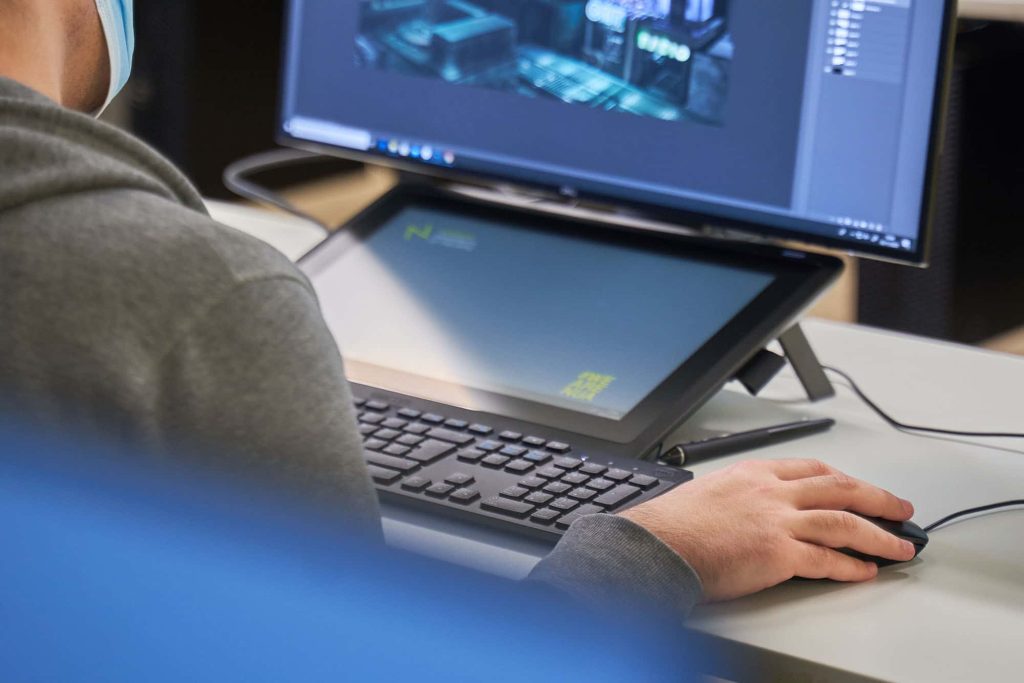Undergraduate open days
Get a taste of life at Norwich, learn more about our courses, our campus and meet the creators and makers you’ll be learning from.


240 study hours on-demand, up to 1 year
The Course fee for one of our short courses for both home and international students is £2,384 for the year 2025/26.
Get a taste of life at Norwich, learn more about our courses, our campus and meet the creators and makers you’ll be learning from.

Institution •
Norwich University of the Arts has officially opened Phase Two of its ambitious redevelopment at 20 Bank Plain — a landmark Grade II listed building in the heart of Norwich.
Read more about Norwich University of the Arts opens Phase Two of landmark Bank Plain building
Graduation •
Five leading figures from the fields of design, fashion, games and the visual arts will be awarded Honorary Professorships at the University’s graduation ceremonies next week.
Read more about Norwich University of the Arts announces five new Honorary Professors
Alumni •
Toby Hills, Senior Technician – Immersive & Virtual Production at Norwich University of the Arts, has been named Best Newcomer and awarded a prestigious Papin Prize during the UK Higher Education Technicians Summit (HETS) 2025 held this week.
Read more about Toby Hills Wins Prestigious Papin Prize at HETS 2025
Alumni •
Norwich University of the Arts is delighted to announce the appointment of Professor Ben Stopher as its next Vice-Chancellor.
Read more about Professor Ben Stopher appointed next Vice-Chancellor
BA Animation •
This summer saw the launch of the University’s new Sustainability Awards, alongside nominations for Norwich students for a range of high-profile industry awards.
Read more about Celebrating award-winning student work at our Undergrad Festival – and beyond
BA Graphic Communication •
Norwich students were awarded a total of five pencils at this year’s D&AD New Blood Awards, which showcase recent graduate work across design, advertising and craft.
Read more about Norwich students win at D&AD New Blood Awards 2025
International •
Gresham Global will act as the University’s official representative in India, widening access to world-class creative education.
Institution •
Dr Ellie Nixon and Dr Kirk Woolford have been recognised for their significant contributions to knowledge and high levels of academic achievement.
Read more about Norwich University of the Arts recognises two new professors
Alumni •
Richard Bracewell, Lecturer for BA (Hons) Film and Moving Image Production, worked with Norwich students and graduates to produce the Fens-based comedy.
Read more about Norwich lecturer celebrates world premiere of new film Chicken Town
Alumni •
Norwich University of the Arts has been ranked among the UK's top two specialist creative arts universities — and the highest outside London — in the 2026 edition of The Complete University Guide
Read more about Norwich University of the Arts moves up 25 places in The Complete University Guide
East Gallery •
We are delighted to offer two opportunities to join the University as an East Gallery Fellow – Creative Practice, for twelve months from 1 November 2025 to 31 October 2026
Institution •
The UK games industry is now worth a staggering £7.82 billion, with East Anglia poised to become the next major growth cluster
Research •
Norwich University of the Arts presents a series of live performances and immersive video installations as part of the Norfolk and Norwich Festival.
Read more about Norwich University of the Arts at Norfolk and Norwich Festival
Winners announced in two age categories 11-15 and 16-19, and two theme categories ‘Responsible Production and Consumption’ and ‘Gender Equality’.
Institution •
Norwich University of the Arts is making a bold and exciting move toward a more sustainable future.
Read more about The big switch on: Norwich University of the Arts powers up with solar energy
BA (Hons) Illustration •
Gabriella discusses how her creative practice and wider University experience has helped to manage and communicate topics around mental health.
Read more about In conversation with Gabriella Mason, BA (Hons) Illustration
Discover our courses and take the first step towards unleashing your potential
Be part of the Future. Take your digital creativity to a whole new level and equip yourself with the skills needed for a career in the creative tech and digital arts industries.